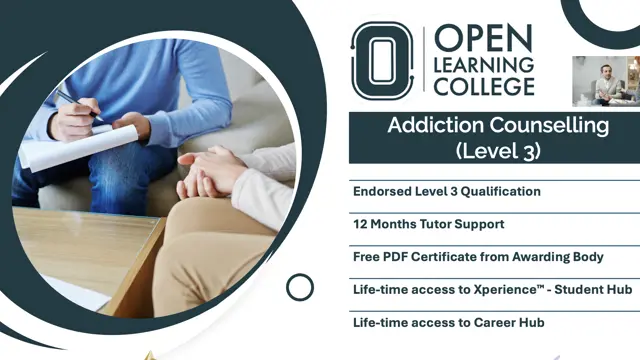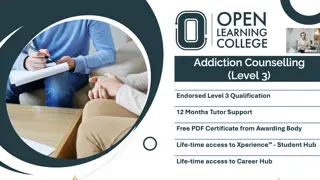
Addiction Counselling (Level 3)
Distance Learning Course, featuring tutor support and AI assistance, available online or as a study pack option.
Open Learning College
Summary
Funding options available on our website
- QLS & OPA - Free
- Exam(s) / assessment(s) is included in price
- Tutor is available to students
- TOTUM card included in price What's this?
Add to basket or enquire
Overview
Embark on a transformative learning journey with the UK’s most innovative home study provider, offering courses designed to unlock your true potential and facilitate the career change you desire. Access our distance learning courses directly from anywhere, anytime, and acquire industry-recognised Professional Qualifications essential for advancing in your career.
Specifically, explore the flexible and convenient Addiction Counselling (Level 3) course, an ideal way to gain a diploma qualification. Whether you aim for further education, improved job prospects, or expanded knowledge, this comprehensive course allows you to prepare thoroughly for exams or careers through home study. Plus, it’s structured to be accessible and beneficial even if you have no prior knowledge in Addiction Counselling.
This course is accepted by ACCPH at Level 3 and allows you to join as a professional member after graduation.
Addiction involves powerful compulsions to use and do certain things excessively, often out of a need to escape from upsetting emotions or situations. These behaviours can trigger a self-perpetuating process, which can cause pain and suffering not only for those addicted, but also for their family and friends. Addictions can develop from many sources, including drinking alcohol, taking drugs, eating disorders and gambling. Often, addictions begin as a result of how these activities make people feel emotionally and physically. These feelings can be initially pleasurable – triggering a desire to carry out the activity again to recreate this ‘high’. This may develop into a repetitive cycle that becomes very hard to break.
Addiction Counselling is a fast-growing and popular counselling service. This course provides your opportunity to gain a Diploma that will enhance your career and counselling practice. This Level 3 Diploma Course will be of particular interest to those working in healthcare professions. It will also be relevant to people in social work areas, teachers and those involved in pastoral work.
The Level 3 Diploma course is designed to follow on from, and complement a basic or introductory counselling course. However, reappraisal of basic counselling skills and core knowledge will be covered in the first module, together with a detailed examination of the five approaches to counselling.
This course focuses on the assessment and analysis of psychosocial factors associated with addiction, together with the appreciation of how addictive behavioural problems present challenges for the counsellor or helper. The course will specifically address substance and alcohol addiction, although the theories, concepts and working models can be applied to most addictive behaviours and problems.
Achievement
Certificates
QLS & OPA
Digital certificate - Included
Open Learning College have undergone external quality checks to ensure that the organisation and the courses’ it offers meet a high standard. Regular reviews of our courses are carried out as part of the endorsement process.
The course depth and study has been benchmarked at Level 3 against level descriptors published by Ofqual.
Visit www.qualitylicencescheme.co.uk for more information.
1. You will receive your accreditation directly from QLS, once you have successfully completed your course (certification fees are included in the course fee).
2. You will receive the Open Pathway Accreditation Diploma (OPA.dip) from Open Learning College.
Course media
Resources
- Addiction Counselling Level 3 (QLS) Course -
Description
What Will You Learn?
- In Addiction Counselling, you'll delve into various aspects of addictive behaviors, understanding the psychological and physiological effects of addiction on individuals and their families.
- You'll learn intervention strategies, therapeutic approaches, and effective communication techniques crucial for supporting individuals coping with addiction.
- Techniques such as cognitive-behavioral therapy, motivational interviewing, and relapse prevention are typically covered, along with exploring the impact of different substances and behaviors on mental health and well-being.
- Understanding the biological, psychological, and social components of addiction is fundamental to this field of study.
Course Key Topics
The Addiction Counselling (Level 3) course is divided into 10 modules.
Module 1: Introduction to addiction, discussion and reappraisal of counselling skills
This module explores the subject of addiction in broad terms. It summarises basic counselling knowledge and skills. These include how theories and approaches of counselling have developed from the work of Freud, Rogers, Skinner, Ellis, Jung and Egan. Corresponding counselling approaches and the evolution of modern approaches are also examined.
Module 2: The psychodynamic approach relevant addiction therapy
In this module, students will examine the psychodynamic approach to counselling, learning how to identify counselling situations in which this approach may be suitable. Concepts such as defence mechanisms, transference and counter-transference will be explained. Students will gain knowledge of the relevance of the psychodynamic approach in the context of addiction therapy.
Module 3: The cognitive behavioural approach relevant to addiction therapy
This module explores the popular cognitive behavioural approach and how it can be applied to the addiction counselling field. The student will gain insight into the depth of behavioural change in this area of therapy. Specific examples and activities will give the student indications as to which particular set of client circumstances benefits most from this approach.
Module 4: The person-centred approach relevant to addiction therapy
This module examines the key concepts of the person-centred approach to counselling. These include Maslow’s hierarchy of needs, specific techniques and their relevance and application to counselling. Areas of application where underlying problems and situations are present will be discussed.
Module 5: Client-counsellor relationships in addiction therapy
This module addresses ethical strategy, boundaries or limitations and will reinforce recognition of active listening, empathy and unconditional positive regard. The integration of approaches to suit client needs are described, as group dynamics.
Module 6: Understanding addiction: part 1
This module focuses on the physiological and psychological changes and effects of addiction. Students will gain understanding of reinforcement in addictive behaviour, and of the basic action of drugs and their effects. This includes knowledge of the central nervous system in relation to addiction.
Module 7: Understanding addiction: part 2
This module continues with the physiological and psychological themes that have been already discussed. The categorisation and classification of commonly taken drugs are described. Students will learn about the common psychological disorders that relate to causes and effects of addiction. Models of counselling are explained in their context with addiction.
Module 8: Focusing on substance addiction
This module defines and categorizes the most commonly use drugs that exist in society today, and the factors that may contribute to substance misuse. In addition it will discuss the effects of these drugs on the person and how behaviours are changed as a result of becoming an addict. The specific and specialised counselling skills necessary for working within this field of therapy will be outlined and discussed.
Module 9: Focusing on alcohol addiction
This module examines the factors that contribute to alcohol abuse and the physiology behind alcohol addiction. It explores the growing issue of alcohol usage, its effects on both the clients and those around them, including their families, colleagues and friends. Students will gain knowledge of specialised counselling skills.
Module 10: Discussion on other addictions such as smoking, food and shopping
This module provides information about other more common addictions. Students will gain understanding of the factors that contribute to addictions that including smoking, shopping, gambling, food and sex. Comparisons will be drawn between various addictive behaviours that have been examined throughout this course, and the complexity of some addictions will be addressed, including multiple addictions, or serious contributing and underlying problems. The student will gain confidence in drawing up appropriate counselling programmes that present in the therapeutic environment.
What's Included
- All online textbooks, study guides, and learning aids designed for online learning.
- A full range of student services, including 12 months tutor access.
- Free Open Learning College branded promotional item when you enrol.
- A personalised award upon course completion with unlimited educational support.
- PDF or hardcopy certificate to show employers (employer has access to certificate validation)
- Life-time access to Xperience™ our innovative, interactive Student Hub.
- Life-time access to Career Hub our dedicated portal to support our students career aspirations.
- Learning for Life Pack
- Invitation to job fairs and career days for your faculty.
Who is this course for?
- The target audience for Addiction Counselling typically includes aspiring counselors, therapists, healthcare professionals, or individuals passionate about supporting those affected by addiction.
- It's for individuals seeking a deep understanding of addictive behaviors, substance abuse, and related psychological and physiological impacts.
- This course caters to those committed to making a difference in the lives of individuals dealing with addiction, whether in clinical settings, rehabilitation centers, or community-based support programs.
- It welcomes individuals seeking to develop comprehensive skills to support individuals and families coping with addiction-related challenges.
Requirements
- The good news is that no prior learning knowledge or experience is essential to take this course. This course is openly available to anyone wishing to learn more about Addiction Counselling (Level 3) and would like to take part in a highly rewarding distance learning study course.
- We believe that everyone should have the opportunity to expand their knowledge and study further, so we try to keep our entry requirements to a minimum.
- You have the freedom to start the course at any time and continue your studies at your own pace for a period of up to 12 months from initial registration with full tutor support.
Career path
As a psychotherapist you’ll help clients explore and express their thought processes, feelings and behaviour. Sessions with clients can cover a range of issues
Questions and answers
Reviews
Currently there are no reviews for this course. Be the first to leave a review.
Legal information
This course is advertised on reed.co.uk by the Course Provider, whose terms and conditions apply. Purchases are made directly from the Course Provider, and as such, content and materials are supplied by the Course Provider directly. Reed is acting as agent and not reseller in relation to this course. Reed's only responsibility is to facilitate your payment for the course. It is your responsibility to review and agree to the Course Provider's terms and conditions and satisfy yourself as to the suitability of the course you intend to purchase. Reed will not have any responsibility for the content of the course and/or associated materials.



